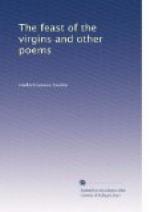The Autumn was past and the snow
lay
drifted and deep on the prairies;
From his teepee of ice came the foe—
came
the storm-breathing god of the winter.
Then roared in the groves, on the plains,
on
the ice-covered lakes and the river,
The blasts of the fierce hurricanes
blown
abroad from the breast of Waziya. [3]
The bear cuddled down in his den,
and
the elk fled away to the forest;
The pheasant and gray prairie-hen
made
their beds in the heart of the snow-drift;
The bison herds huddled and stood
in
the hollows and under the hill-sides,
Or rooted the snow for their food
in
the lee of the bluffs and the timber;
And the mad winds that howled from the north,
from
the ice-covered seas of Waziya,
Chased the gray wolf and silver-fox forth
to
their dens in the hills of the forest.
Poor Father Menard—he was ill;
in
his breast burned the fire of a fever;
All in vain was the magical skill
of
Wicasta Wakan [61] with his rattle;
Into soft, child-like slumber he fell,
and
awoke in the land of the blessed—
To the holy applause of “Well-done!”
and
the harps in the hands of the angels.
Long he carried the cross and he won
the
coveted crown of a martyr.
In the land of the heathen he died,
meekly
following the voice of his Master,
One mourner alone by his side—
Ta-te-psin’s
compassionate daughter.
She wailed the dead father with tears,
and
his bones by her kindred she buried.
Then winter followed winter. The years
sprinkled
frost on the head of her father;
And three weary winters she dreamed
of
the fearless and fair, bearded Frenchmen;
At midnight their swift paddles gleamed
on
the breast of the broad Mississippi,
And the eyes of the brave strangers beamed
on
the maid in the midst of her slumber.
She lacked not admirers;
the
light of the lover oft burned in her teepee—
At her couch in the midst of the night,—
but
she never extinguished the flambeau.
The son of Chief Wazi-kute—
a
fearless and eagle-plumed warrior—
Long sighed for Winona,
and
he was the pride of the band of Isantees.
Three times, in the night at her bed,
had
the brave held the torch of the lover, [75]
And thrice had she covered her head
and
rejected the handsome Tamdoka. [T]
[T] Tah-mdo-kah, literally, the buck-deer.




